may participate on student advisory committees and in student research projects if holding Allied Graduate Faculty Status, but may not be a major advisor or mentor
Athletic Training
.jpg)
Dani M. Moffit, PhD, LAT, ATC
MSAT Program Director
Associate Professor
Office: Garrison Hall 216
Research Areas:
- Sexual harassment in athletic training
- Cultural literacy in health professions
.jpg)
Karla Judge, DAT, LAT, ATC
Assistant Professor, MSAT Coordinator of Clinical Education
Office: Reed Gym 311
Research Topics:
- Clinical skills for injury assessment and treatment.
Audiology-Meridian
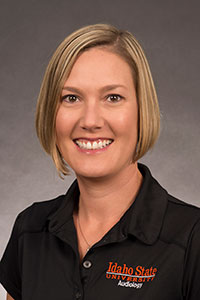
Dr. Gabe Anne Bargen, Ph.D., CCC-A/SLP
Associate Professor
Office: MHSC, Room 819G
Research Topics:
- Pediatric audiology
- Electrophysiology testing (evoked potentials)
- Aural rehabilitation
Education
- Doctor of Philosophy (Ph.D.), Audiology, 2010, University of Kansas
- Master of Arts (M.A.), Audiology, 2006, University of Kansas Medical Center
- Master of Science (M.S.Ed.), Education - Speech-Language Pathology, 2002, University of Nebraska at Kearney
- Bachelor of Science (B.S.), Communication Science and Disorders, 2000, Texas Christian University
Personal Interests/Hobbies: Singing, reading, outdoor activities
Audiology-Pocatello
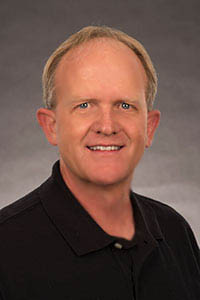
Dr. Jeff Brockett, Ed.D, CCC-A
Associate Professor
Audiology Admissions Coordinator
Office: SPA Building 68, Room 122
Education
- Doctor of Education (Ed.D.), Educational Leadership, Instructional Technology, 2002, Idaho State University
- Education Specialist (Ed.S.), Special Education, 1998, Idaho State University
- Master of Science (M.S.), Audiology, 1987, Idaho State University
- Bachelor of Science (B.S.), Communication, 1982, University of Idaho
Professional Interests: Vestibular and Balance Evaluation, Wide Band Reflectance, Auditory Pathologies, Online Learning
Personal Interests/Hobbies: Photography, metal and woodworking
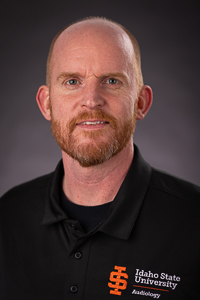
Dr. Curtis Billings, Ph.D., CCC-A
Assistant Professor
Office: SPA Building 68, Room 221
Education
- Doctor of Philosophy (Ph.D.), Audiology, 2008, University of Washington
- Master of Science (M.S.), Audiology, 2002, University of Washington
- Bachelor of Science (B.S.), Speech & Hearing Science (Spanish Minor), 2000, University of Utah
Research Topics
- Speech understanding in complex backgrounds
- Brain-behavior relationships
- Neuroplasticity
- Hearing impairment
- Aging
Biography
Dr. Billings uses human electroencephalography, specifically auditory evoked potentials, and behavioral methods to understand the effects of auditory deprivation and stimulation on the brain. This includes interests in the neural effects of hearing aids, hearing impairment, aging, and auditory training. The long-term goal of this research program is to improve the diagnosis and treatment of hearing impairment by determining how experience-related changes in the brain facilitate and/or inhibit successful auditory rehabilitation. Dr. Billings is also a licensed audiologist.
Personal Interests/Hobbies
Camping, hiking, and family time
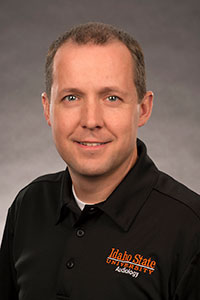
Dr. Chris Sanford, Ph.D., CCC-A
Associate Dean for Research and Faculty Development
Professor
Office: SPA Building 68, Room 204
Research Topics:
- Diagnostic audiology, including:
- Middle ear assessment
- Otacoustic emissions
*pediatric focused
Education
- Postdoctoral Fellowship, 2006-2009, Boys Town National Research Hospital
- Doctor of Philosophy (Ph.D.), Audiology, 2006, University of Washington
- Master of Science (M.S.), Audiology, 1999, Brigham Young University
- Bachelor of Science (B.S.), Audiology and Psychology, 1997, Brigham Young University
Personal Interests/Hobbies: Spending time with family, gardening, mountain biking and cooking
Speech-Language Pathology-Meridian
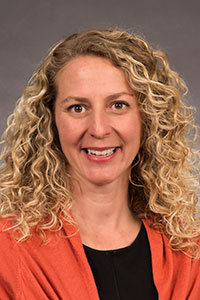
Kristina Blaiser, Ph.D., CCC-SLP
Professor
Office: Meridian Health Science Center, Room 808C
Education
- Doctor of Philosophy (Ph.D.) in Speech-Language Hearing Sciences, 2010, University of Minnesota, Minneapolis, MN
- Master of Arts (M.A.) in Communication Disorders and Speech Sciences, 1998, University of Minnesota, Minneapolis, MN
- Bachelor of Science (B.S.) in Communication Sciences and Disorders, 1996, University of Wisconsin, Madison, WI
Professional Areas of Interests: Program evaluation and assessment of children who are deaf/hard-of-hearing, family coaching, telehealth models of service delivery
Personal Interests/Hobbies: time with family and friends, outdoor activities, music & reading
.jpg)
Kris L. Brock, Ph.D., CCC-SLP
Assistant Professor (AAC)
Office: Meridian Health Sciences Center, Room 808D
- Augmentative and alternative communication
- Autism
- Aphasia
- Symbol animation
- Syntax
Education:
- Doctor of Philosophy (Ph.D.) in Communication Sciences and Disorders, 2015, Texas Tech University Health Sciences Center, Lubbock, TX
- Master of Science (M.S.) in Speech Language Pathology, 2008, University of the Pacific, Stockton, CA
- Bachelor of Science (B.S.) in Speech Language Pathology, 2007, University of the Pacific, Stockton, CA
Lab Description:
Everyone must have access to communicate, regardless of any other variable. That is why the AACCT (Assisting Adults and Children to Communicate through Technology) Lab is committed to ensuring that people with complex communication needs (e.g., autism and aphasia) are able to utilize mainstream technologies that allow them to learn language and engage in meaningful social interactions.
The AACCT Lab focuses on human-technology interaction research. Specifically, our current projects focus on animation technology to determine if children and adults better comprehend animated action words when compared to static cartoon line drawings depicting the same words. We are also committed to investigating how animation can improve an individual's ability to comprehend and produce symbol sequences. Finally, the AACCT Lab partners with Dr. Diane Ogiela's research to investigate how animated stories impact narrative outcome measures in children with and without language disorders.
Personal Interests: International Therapy (Belize), skiing, surfing, theme parking (“No, no I don’t want to build a snowman.”), traveling (Germany here I come!), IPA is more than just phonetics, and Tough Mudder®
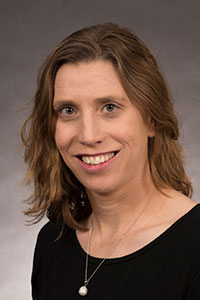
Alycia Cummings, Ph.D., CCC-SLP
Associate Professor
CSD Department Chair
Office: Meridian Health Science Center, Room 808A
Education:
- Doctor of Philosophy (Ph.D.) in Language and Communicative Disorders, 2009, University of California, San Diego and San Diego State University
- Bachelor of Arts (B.A.) in Psychology, 2000, Stanford University
Research Topics:
- Treatment efficacy
- EEG/ERP
- Developmental speech sound disorders
Lab Description:
In the Brain and Behavior Lab, our main goal is to pinpoint the causes of developmental speech sound disorders. By understanding these causes, we can develop effective intervention plans to help children improve their ability to produce and use sounds. We use a variety of tools, including behavior and electrophysiological analysis, to diagnose and guide our intervention recommendations.
Personal Interests/Hobbies: Walking my dogs, gardening, watching movies, listening to audio books
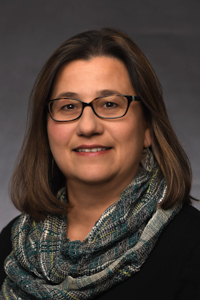
Diane Ogiela, Ph.D., CCC-SLP
Associate Professor
Office: Meridian Health Science Center, Room 808B
Education
- Postdoctoral Fellowship, Developmental Neurolinguistics Lab, 2009, University of Texas at Dallas, Callier Center for Communication Disorders, Dallas, TX
- Doctor of Philosophy (Ph.D.) in Audiology and Speech Sciences, 2007, Michigan State University, East Lansing, MI
- Master of Science (M.S.) in Audiology and Speech Sciences, 1995, Purdue University, West Lafayette, IN
- Master of Arts (M.A.) in Linguistic Studies, 1993, Syracuse University, Syracuse, New York
- Bachelor of Arts (B.A.) in Psychology, 1991, Illinois Benedictine College, Lisle, IL
Professional Areas of Interests: Language science, language development and processing in children with Specific Language Impairment (SLI), morphology and syntax, school-age language disorders, approaches to assessment in child language, and language sample analysis training.
Research: Using event-related potentials/electrophysiological measures to examine language processing in children with specific language impairment; Evaluation of morphology and complex syntax comprehension and production in children with SLI; Language sample analysis training outcomes in undergraduate and graduate SLP students.
Personal Interests/Hobbies: Traveling, hiking, biking, camping, gardening, cooking, reading, watching science fiction and super-hero movies
Speech-Language Pathology-Pocatello
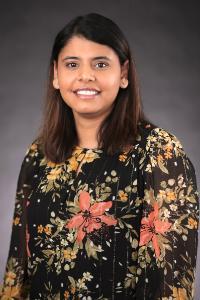
Saryu Sharma, Ph.D.
Assistant Professor
Office: SPA Building 68, Room 308A
Education
- Doctor of Philosophy (Ph.D.) in Communication Sciences and Disorders, 2021, East Carolina University, Greenville, NC
- Master of Science (M.S.) in Speech-Language Pathology, 2014, All India Institute of Speech and Hearing, Mysore, India
- Bachelor of Science (B.S.) in Speech-Language Pathology and Audiology, 2011, Bangalore University, Bengaluru, India
Research Topics:
- Nature and treatment of adult neurogenic disorders (e.g., aphasia; right hemisphere damage)
- Intensive service delivery models for rehabilitation
Research Lab Description:
My research is primarily focused on studying language and cognition in adult neurogenic disorders. In my research lab, we are studying the relationship between cognitive functioning and sentence and discourse processing in adults with aphasia using eye tracking. We are also investigating discourse production deficits in adult neurogenic disorders (e.g. people with aphasia, Parkinson's disease).
Hobbies: Pilates, traveling, cooking, music and dancing
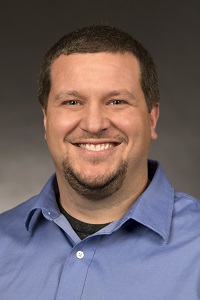
Daniel Hudock, Ph.D., CCC-SLP
Associate Professor
Founder/Director of the Northwest Center for Fluency Disorders (NWCFD)
Office: Pocatello, SPA Building 68, Room 322
Education
- Doctor of Philosophy (Ph.D.) in Communication Sciences and Disorders, 2012, East Carolina University
- Masters of Science (M.S.) in Communication Sciences and Disorders, 2008, East Carolina University
- Bachelor of Science (B.S.) in Communication Sciences and Disorders, 2006, Clarion University of Pennsylvania
Professional Areas of Interests: Stuttering and other fluency-based disorders, counseling and interprofessional collaborations between mental-health professionals and Speech Language Pathologists, Acceptance and Commitment Therapy (ACT), and the neuroscience of speech perception and production as measured via EEG.
Research Interest Include: Training and outcomes related to interprofessional collaborations between mental-health professionals and Speech Language Pathologists, holistic stuttering therapy targeting emotional, psychological, and social impacts from communication disorders, Acceptance and Commitment Therapy (ACT), sender / receiver dynamics during communication exchanges via biopsychophysiological measures (electro-dermal skin conductance response, heart-rate variability, and eye-tracking), and EEG analysis of speech perception and production in fluent speakers and speakers who stutter.
Personal Interests/Hobbies: Anything outdoors (camping, backpacking, hiking, mountain biking, kayaking, spending time at the beach, etc.), traveling, sports (racquetball, tennis, golf, disc golf, softball.), the Pittsburgh Steelers, the arts (plays, musicals, galleries, exhibitions, museums, concerts), spending time with family, dining, cooking, technology, listening to podcasts, watching TED videos, reading, anything to do with science and pretty much anything else.
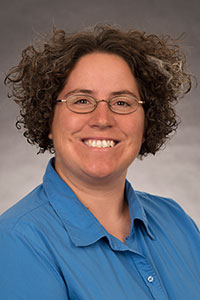
Heather L. Ramsdell, Ph.D, CCC-SLP, ALT in Training
Associate Professor
Office: SPA Building 68, Room 330B Labs: Nursing Building 66, Rooms 332, 334 & SPA Building 68, Rooms 212, 213
Education
- Doctor of Philosophy (Ph.D.) in Speech-Language Pathology, 2009, The University of Memphis
- Master of Science (M.S.) in Speech-Language Pathology, 2003, Boston University
- Bachelors of Art (B.A.) in Speech-Language Pathology and Audiology, 2001, Iona College
Research Areas:
- Dyslexia
- Infant vocal development
Biography:
Dr. Heather L. Ramsdell is an Associate Professor at Idaho State University, owner of/clinician at Once Upon a Time LLC (www.readwithramsdell.com), and a founding member of the Structured Word Inquiry Research Vanguard (SWIRV).
Her teaching, research, and clinical interests include:
- Infant vocal development
- Phonetics
- Phonology
- The scholarship of teaching and learning
- Multisensory structured language intervention
- Literacy
- Spelling
- Dyslexia
Clinically, she is intensively trained in Scottish Rite's Take Flight reading intervention, which she implements to help children/adults who are struggling to read and those with dyslexia by addressing phonemic awareness, phonics, vocabulary, reading fluency, reading comprehension (and spelling, handwriting, recognition of sight words, etc.) through multisensory, structured, explicit, evidence-based lessons.
Her current research includes work on comparing multisensory structured language intervention with traditional speech-language pathology services, considering parent self-efficacy and advocacy in raising children with dyslexia, exploring ways to better inform educators and pre-service educators about dyslexia (what it is, how to identify it, and how to treat/support/accommodate individuals with dyslexia), and norming the Speech Sound Development Screener (a parent report tool that was designed to effectively and efficiently flag at-risk infants/toddlers from 6 to 18 months of age).
Heather is also actively involved in advocacy surrounding dyslexia at the state level in Idaho, where her role is multifaceted, as a representative of higher education, health-related professions, and a parent of a child with dyslexia. She plans to begin training to become a Qualified Instructor (QI) of Certified Academic Language Therapists (CALT) in August of 2023.
In her free time, Heather enjoys family time, hiking, biking, skiing, crocheting, reading, traveling, and camping.
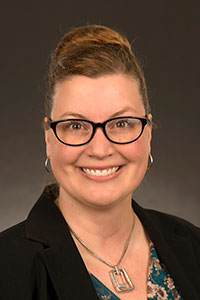
Victoria (Tori) Scharp, Ph.D., CCC-SLP
Program Director, PhD in Rehabilitation & Communication Sciences
Assistant Professor
Office: SPA Building 68, Room 314B
Research Areas:
- Nature and treatment of adult neurogenic disorders (e.g aphasia, right hemisphere damage
- Intensive service delivery models for rehabilitation
Education
- Doctor of Philosophy (Ph.D.) in Communication Sciences and Disorders, 2016, University of Pittsburgh, Pittsburgh, PA
- Master of Arts (M.A.) in Speech-Language Pathology, 2002, Miami University, Oxford, OH
- Bachelor of Science (B.S.) in Speech-Language Pathology and Audiology, 2000, Miami University, Oxford, OH
Biography:
Victoria (Tori) Scharp, PhD CCC-SLP is an Associate Professor in the Department of Communication Sciences and Disorders. Dr. Scharp completed her Ph.D. at the University of Pittsburgh and has worked clinically for over 15 years in a wide variety of settings. Dr. Scharp is part of an integral international working group that studies the scope and implementation practices of intensive aphasia programs and she is a guest editor for an upcoming special issue in Aphasiology commemorating 10 years of Intensive Comprehensive Aphasia Programs as a service delivery model. Dr. Scharp also supports a research team in the College of Health that studies patient engagement measurement scales in community-engaged health research.
Lab Description:
Dr. Scharp directs the Scharp Language and Brain Lab housed on the Pocatello campus and is the co-founder of the Mountain West Aphasia Research Collective with Dr. Catherine Off at the University of Montana. Dr. Scharp's clinical line of research centers on patient outcomes including discourse-level variables, student training competencies, and family care partner perspectives associated with intensive aphasia rehabilitation programs of varying durations.
Current projects and initiatives:
- Sustainability factors including facilitators and barriers to Intensive Comprehensive Aphasia Programs (ICAP)
- Classifying gaps in the ICAPs evidence base
- Discourse outcomes following participation in ICAPs and modified-ICAPs
- Humor instances in ICAP group therapy
- Systematic review of quantitative engagement measurement scales in community-engaged health research
Hobbies: hiking, playing tennis, reading, snowshoeing, and traveling
Occupational Therapy
Physical Therapy-Meridian
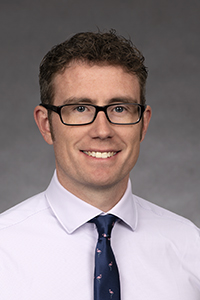
Joshua Woolstenhulme, PT, DPT, PhD
Assistant Professor
Office: Meridian Health Science Center 811C
Physical Therapy-Pocatello
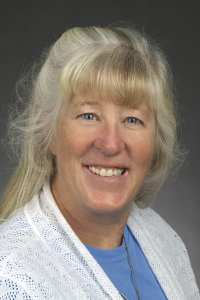
Nancy Devine, PT, DPT, PhD
Associate Professor
Office: Garrison Hall 312
Research Areas:
- Motor control and learning for people post-stroke
- Neuroplastic pain reduction for complex regional pain syndrome
Education:
- PhD Experimental Psychology, Idaho State University, Pocatello ID 2020
- DPT Physical Therapy, MGH Institute of Health Professions, Boston MA 2006
- MS Biology (emphasis neuroanatomy), Idaho State University, Pocatello ID 1993
- BS Physical Therapy, University of Vermont, Burlington VT 1986
Biographical Sketch:
Dr. Devine has clinical experience in acute care, inpatient/outpatient neurologic rehabilitation, and hospice. She has been a faculty member at ISU since 1990 and currently teaches multisystem management.
Research Projects (Current and Future):
Virtual Reality Mirror Box Intervention
Participants >1 year post-stroke use a virtual reality headset that incorporates use of the intact arm to perform virtual tasks that are reflected to make it appear as if they are using the affected arm. The observation of the affected arm performing virtual tasks, even though they are actually performed by the intact arm, may provide neuroplastic changes in the brain to support recovery of voluntary movements in the affected arm. Participants also participate in an equivalent number of sessions practicing using the affected arm.
Augmented Reality Mirror Box Intervention
This area of research is a collaboration with a practicing physical therapist who developed an app to provide a reflected augmented reality view of the world. Patients receiving physical therapy services for complex regional pain syndrome in the arm or leg use the MirrorBox app to see the real word reflected (augmented reality). They then provide progressive sensory stimulation to the intact limb while perceiving the stimulation to be occurring on the involved, painful limb. Experiencing the visual perception of being able to apply progressively more sensory stimulation to the involved limb (even though it is actually occurring on the intact lim) assists in developing neuroplastic changes in which sensory stimuli actually applied to the painful limb are no longer perceived as being painful.
Body-Weight-Support Treadmill Training
We are developing a research protocol to have participants > 1 year post stroke who are interested in regaining the ability to run. Body-weight-supported treadmill training will be used to provide a safe environment to practice running at progressively increased speeds and eventually reducing the amount of body weight supported. The running mechanics trained on the treadmill will then be trained over-ground.
Personal Interests/Hobbies:
- Outdoor activities: hiking, fly-fishing, kayaking, skiing, snowshoeing
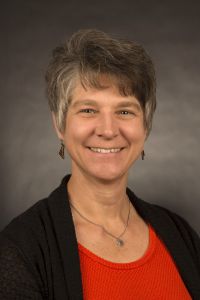
Deanna Dye, PT, PhD
Physical Therapy Program Director
Associate Professor
Office: Garrison Hall 218
Research Areas:
- Test validation
- Testing of constructs/concepts
- Clinical reasoning
- Educational research
Education:
- BS in Physical Therapy, Boston University, Boston MA 1990
- MA in Adult Education, University of Wyoming, Laramie WY 2000
- PhD in Higher Education, University of Idaho, Moscow ID 2007
Professional / Research Areas of Interest:
Critical reflection, chronic pain and cervical pain, meaningful measurement.
Biographical Sketch:
Dr. Dye has clinical experience primarily in adult rehabilitation in a variety of settings. She has expanded experience with vestibular rehabilitation, spinal cord injury, geriatrics, and wound care. She has worked as a faculty member since 1996 both at physical therapist assistant and physical therapist education programs. She currently teaches in the areas of vestibular rehabilitation, wound care, and physical agents. She is certified in vestibular rehabilitation with a specific clinical interest in cervicogenic dizziness and chronic pain management.
Personal Interests/Hobbies:
Outdoor recreation, yoga, gardening, and music
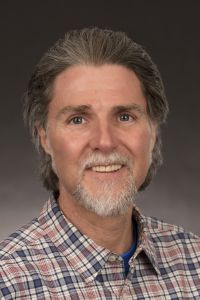
Mike Foley, PT, PhD
Associate Professor
Office: Garrison Hall 311
Education:
- BS Business Administration, North Adams State College, North Adams MA 1985
- MS Exercise Physiology, University of Southern Mississippi, Hattiesburg MS 1988
- Ph.D. Exercise Physiology, University of Southern Mississippi, Hattiesburg MS 1991
- MA Physical Therapy, College of St. Scholastica, Duluth MN 1996
Professional / Research Areas of Interest:
Oncology Rehabilitation, physical function, physical activity, exercise physiology
Recent Publications:
Lenker, Hallie PT, DPT; Foley, Michael PT, PhD, Pre-Bone Marrow Transplant Physical Therapy Evaluations in Pediatric Oncology, Rehabilitation Oncology: October 2019- Volume 37- Issue 4 p E9-E11 doi:10.1097/01.REO0000000000000181
Foley, MP, Bean, D, Jernigan, D. Quanitification and Comparison of Metabolic and Cardiorespiratory Responses to Increasing Levels of Support during Bodyweight-Supported Treadmill Running in Trained Runners Running at Anaerobic Threshold. Journal of Exercise Physiology online, December 2018: 21(6): 1-11 (ISSN1097-9751)
Foley, MP, Hasson, SM, Gee, BM. Effects of a Translational Community-Based Multimodal Exercise Program on Sleep Quality in Breast Cancer Survivors: A Pilot Study. Journal of Exercise Medicine, April 2018. Volume 3 Number 2. ISSN 2378-4083
Foley, MP, Hasson, SM, Kendall,E. Effects of a Translational Community-Based Multimodal Exercise Program on Quality of Life and the Influence of Start Delay on Physical Function and Quality of Life in Breast Cancer Survivors: A Pilot Study. Integrative Cancer Therapies, September 2017: https://doi.org/10.1177/1534735417731514
Foley, MP, Hasson. Effects of community-based multimodal exercise program on health-related physical fitness and physical function in breast cancer survivors: a pilot study. Integrative Cancer Therapies, January-March 2016: 1-9. Sage, DOI: 10.1177/1534735416639716
Foley MP, Barnes VA, Hasson SM. Effects of a community-based multimodal exercise program on physical function and quality of life in cancer survivors: a pilot study. Physiotherapy Theory and Practice, 2015 Jul; 31(5): 303-12. DOI:10.3109/09593985.2015.1004390 PubMed PMID: 25613524
Foley M, Bowen B. Comparison of metabolic cost and cardiovascular response to stair ascending and descending with walkers and canes in older adults. Archives of Physical Medicine and Rehabilitation. 2014 Sep; 95(9):1742-9. PubMed PMID: 24755046.
Biographical Sketch:
Dr. Foley has 14 years of full-time clinical experience in a variety of settings and practice areas. He is a certified lymphedema therapist and has experience in oncology rehabilitation. He has worked as a PT faculty member at universities over 17 years of full-time teaching experience.
Personal Interests/Hobbies:
Outdoor recreation, nature
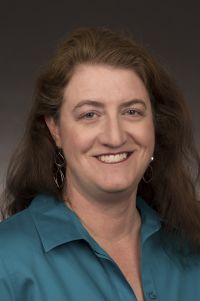
Cindy Seiger, PT, PhD
Associate Professor
Office: Garrison Hall 306
Education
- PhD Exercise Science, Brigham Young University, Provo UT 2009.
- MS Physical Therapy, Rocky Mountain University of Health Professions, Provo UT 2002.
- BS Physical Therapy, University of Ulster, Belfast Northern Ireland, 1999.
Professional
- Board-Certified Clinical Specialist in Geriatric Physical Therapy
- Certified Exercise Expert for Aging Adults
Professional Areas of Interest
- Electrotherapy - pulsed shortwave diathermy & ultrasound
- Joint mobilization/manipulation - peripheral and vertebral joints
- Resilience & resiliency for practitioners and patients
- Behavior change theories - use in physical therapy
- Geriatrics - balance & gait
- Orthopedics - spine, ankle, & shoulder
Current Teaching:
- PTOT 6626 / 6646 Neurological Systems Management & Lab
- PTOT 7727 Geriatric Management
- PTOT 6619 Clinical Practicum
- PTOT 6617 Research Practicum
- PTOT 6616 Capstone
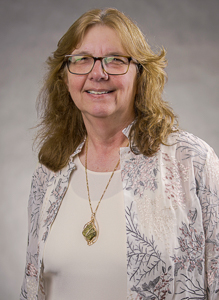
Mary Ellen Oesterle, EdD, PT
Director of Health Science Innovation
Office: Beckley Nursing 319
Research Interests
- Innovative approaches to delivery and evaluation of health care
- Interprofessional approaches to innovation
Biography
Dr. Oesterle is the first-ever Director of Health Science Innovation. Her efforts focus on the coordination of interprofessional education and research, continuing education, along with continuing goals to develop new programs, expand existing programs, international program development, and more.
In previous positions, Dr. Oesterle was the interim chair for the Radford University/Carilion Doctor of Physical Therapy Program and department head for the University of North Georgia Doctor of Physical Therapy Program.
Dr. Oesterle’s past work has taken her across the United States, as well as into international waters, including South Korea and Cuba. Oesterle also developed the first innovation curriculum for a physical therapy program in the country. This included collaboration with Georgia Tech departments, like engineering.

